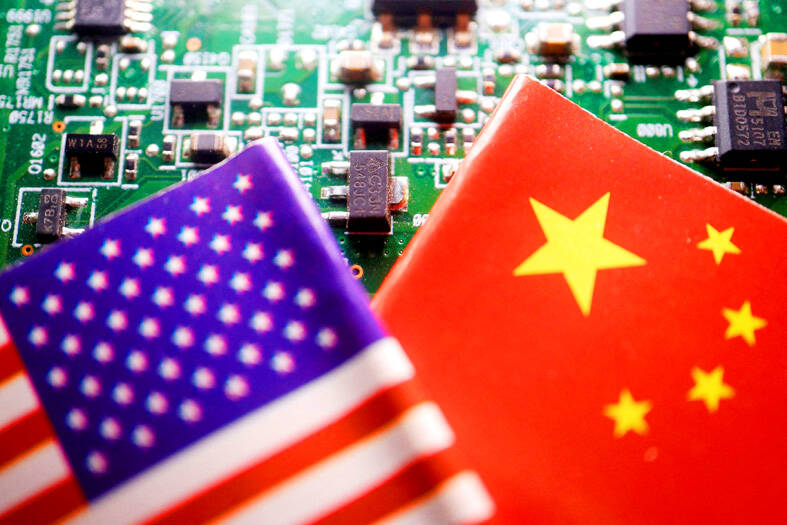Semiconductor shares in China surged yesterday after Reuters reported the US had ordered chipmaking giant Taiwan Semiconductor Manufacturing Co (TSMC, 台積電) to halt shipments of advanced chips to Chinese customers, which investors believe could accelerate Beijing’s self-reliance efforts.
TSMC yesterday started to suspend shipments of certain sophisticated chips to some Chinese clients after receiving a letter from the US Department of Commerce imposing export restrictions on those products, Reuters reported on Sunday, citing an unnamed source.
The US imposed export restrictions on TSMC’s 7-nanometer or more advanced designs, Reuters reported.

Photo: Reuters
Investors figured that would encourage authorities to support China’s industry and bought shares in local makers, sending Semiconductor Manufacturing International Corp (SMIC, 中芯國際) stock up 4.7 percent to a record high.
SMIC is China’s largest foundry and the country’s main alternative to TSMC. It is known for helping Huawei Technologies Co (華為) produce chips used in its latest smartphones, including the Mate 60 and Pura 70.
The CSI Semiconductor Index jumped more than 6 percent during trading to hit a three-year high, while the CSI Integrated Circuits Index rose 5 percent. Information technology shares advanced 4.8 percent to their highest level in two-and-a-half years.
“In the medium and long term, it will force the reorganization of the supply chain, increase the demand for domestic advanced process production capacity, and promote technological breakthroughs in upstream semiconductor equipment and materials,” Chinese brokerage Cinda Securities Co (信達證券) said in a note on Sunday.
Investors have bet that the re-election of Donald Trump as US president could actually benefit strategic sectors in China by drawing state backing and say China is much better prepared for trade tensions than in 2016.
In Taipei trading, TSMC recovered most of its early losses thanks to its sound fundamentals, closing 0.46 percent lower at NT$1,085 after hitting NT$1,070.
TSMC shares were under pressure following Reuters’ report, Cathay Futures Consultant Co (國泰證期顧問) analyst Tsai Ming-han (蔡明翰) said.
“TSMC remains fundamentally healthy, so the earlier losses provided a good opportunity for bargain hunters to buy,” Tsai said, referring to the company’s record high sales of NT$314.24 billion last month, up 29.2 percent from a year earlier.
“To my knowledge, TSMC stopped selling chips made on the 7-nanometer process to China before the report surfaced. The report only had a short-lived impact on TSMC’s share price today,” Tsai said.
Additional reporting by CNA and staff writer

MULTIFACETED: A task force has analyzed possible scenarios and created responses to assist domestic industries in dealing with US tariffs, the economics minister said The Executive Yuan is tomorrow to announce countermeasures to US President Donald Trump’s planned reciprocal tariffs, although the details of the plan would not be made public until Monday next week, Minister of Economic Affairs J.W. Kuo (郭智輝) said yesterday. The Cabinet established an economic and trade task force in November last year to deal with US trade and tariff related issues, Kuo told reporters outside the legislature in Taipei. The task force has been analyzing and evaluating all kinds of scenarios to identify suitable responses and determine how best to assist domestic industries in managing the effects of Trump’s tariffs, he

TIGHT-LIPPED: UMC said it had no merger plans at the moment, after Nikkei Asia reported that the firm and GlobalFoundries were considering restarting merger talks United Microelectronics Corp (UMC, 聯電), the world’s No. 4 contract chipmaker, yesterday launched a new US$5 billion 12-inch chip factory in Singapore as part of its latest effort to diversify its manufacturing footprint amid growing geopolitical risks. The new factory, adjacent to UMC’s existing Singapore fab in the Pasir Res Wafer Fab Park, is scheduled to enter volume production next year, utilizing mature 22-nanometer and 28-nanometer process technologies, UMC said in a statement. The company plans to invest US$5 billion during the first phase of the new fab, which would have an installed capacity of 30,000 12-inch wafers per month, it said. The

‘SWASTICAR’: Tesla CEO Elon Musk’s close association with Donald Trump has prompted opponents to brand him a ‘Nazi’ and resulted in a dramatic drop in sales Demonstrators descended on Tesla Inc dealerships across the US, and in Europe and Canada on Saturday to protest company chief Elon Musk, who has amassed extraordinary power as a top adviser to US President Donald Trump. Waving signs with messages such as “Musk is stealing our money” and “Reclaim our country,” the protests largely took place peacefully following fiery episodes of vandalism on Tesla vehicles, dealerships and other facilities in recent weeks that US officials have denounced as terrorism. Hundreds rallied on Saturday outside the Tesla dealership in Manhattan. Some blasted Musk, the world’s richest man, while others demanded the shuttering of his

Taiwan’s official purchasing managers’ index (PMI) last month rose 0.2 percentage points to 54.2, in a second consecutive month of expansion, thanks to front-loading demand intended to avoid potential US tariff hikes, the Chung-Hua Institution for Economic Research (CIER, 中華經濟研究院) said yesterday. While short-term demand appeared robust, uncertainties rose due to US President Donald Trump’s unpredictable trade policy, CIER president Lien Hsien-ming (連賢明) told a news conference in Taipei. Taiwan’s economy this year would be characterized by high-level fluctuations and the volatility would be wilder than most expect, Lien said Demand for electronics, particularly semiconductors, continues to benefit from US technology giants’ effort